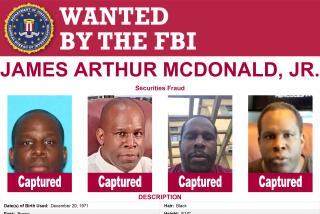Did Money Manager Hide Cash in Mexico?
- Share via
James P. Lewis Jr., the Orange County money manager accused of fraudulently raising $311 million from investors over 20 years, may have millions of dollars stashed away in Mexico, according to the FBI.
The possibility of a secret hoard came to light during an investigation of Sharon Lefevers, a girlfriend of Lewis’ who is alleged to have received a Greenwich, Conn., mansion and other gifts from him, FBI Special Agent Brad Howard said in a statement filed in federal court in Santa Ana last week.
A longtime friend of Lefevers told the FBI “that Lewis had money in an offshore bank account in Cancun, Mexico,” according to the statement. It was introduced as part of the government’s effort to show that Lewis was a flight risk and should continue to be held without bail as he awaits trial on fraud charges.
The Mexican bank account would be significant not only to law enforcement authorities but also to investors. A court-appointed receiver has moved to seize Lewis’ known assets and is searching for more in hopes of returning funds to thousands of investors who lost money.
Lewis investor Janet Goldblatt, who lives in Century City, said the possibility of a Cancun bank account “seemed to confirm what I’ve felt all along about Lewis.”
“A person with that kind of mind would have to have a backup, something stashed away somewhere,” she said.
Howard couldn’t be reached for comment Tuesday. The prosecutor on the case, Assistant U.S. Atty. Gregory Staples, said the court-appointed receiver trying to sort out the financial debacle would take the lead in determining whether the Mexican account existed, and was expected to take testimony from Lefevers as part of that effort.
Lewis, who is being held in the Santa Ana City Jail, hasn’t provided assistance to the receiver, Robb Evans & Associates of Sun Valley, according to Evans’ chief operating officer, Brick Kane.
Kane said Tuesday that the company was still trying to trace Lewis’ funds but hadn’t received any information about hidden cash from Lefevers’ lawyer, Michael Handwerker.
In his court statement, the FBI’s Howard said the lawyer “told me that Lefevers may be able to help the government locate money that Lewis had.” Handwerker said Lefevers was “willing to work with the government in providing information on where the money was in exchange for being allowed to keep her home,” the FBI agent wrote.
Handwerker did not return a call seeking comment.
The government contends Lewis used money taken from investors to buy her the Greenwich mansion, worth an estimated $2.3 million.
Howard said he told Handwerker that the FBI wasn’t interested if such a deal would lead to only $10,000 or $100,000, “but might be more interested if the amount was $10 million.”
“Handwerker told me he was talking about a figure more like the latter figure (meaning $10 million),” Howard wrote.
The FBI agent’s declaration was presented at an April 26 hearing to U.S. District Judge Cormac A. Carney in Santa Ana, who ruled that the 57-year-old defendant must remain in jail until his trial next year.
“Lewis is a serious flight risk, and there are no conditions to reasonably assure his appearance at future court proceedings,” Carney said in his ruling.
After a nationwide manhunt, the FBI arrested Lewis on Jan. 22 at a budget motel in Houston. Agents said they found maps in his room with routes to Mexico marked in felt pen, along with what appeared to be goodbye notes to the women in his life. They also found a copy of a Los Angeles Times story saying the FBI was searching for him -- a factor Carney cited as evidence he knew he was wanted.
Carney’s decision reaffirmed a March 9 no-bail ruling by U.S. Magistrate Judge Arthur Nakazato, before whom Lewis made his initial appearances on criminal charges. Nakazato noted that Lewis allegedly transferred more than $10 million in investor funds to his wife, two girlfriends and their families.
Kane said that despite the statements made to the FBI, Evans was advising investors not to get their hopes too high about finding “a pot of gold offshore.”
Lewis, he said, had made a career out of lying about money, “and no one has given us any specifics” about secret accounts.
More to Read
Sign up for Essential California
The most important California stories and recommendations in your inbox every morning.
You may occasionally receive promotional content from the Los Angeles Times.














